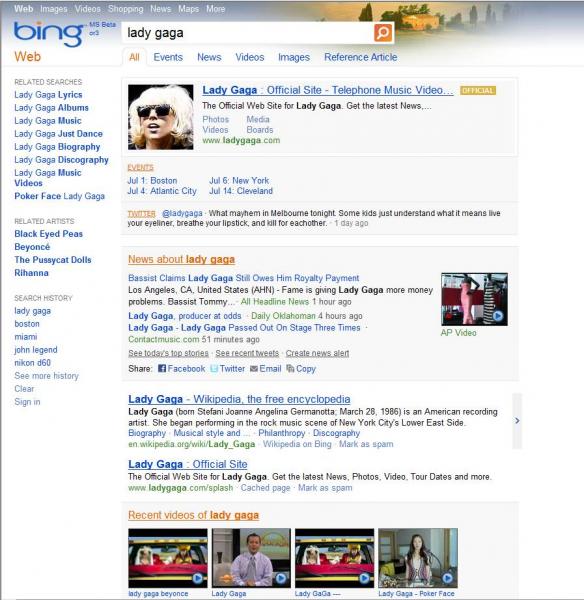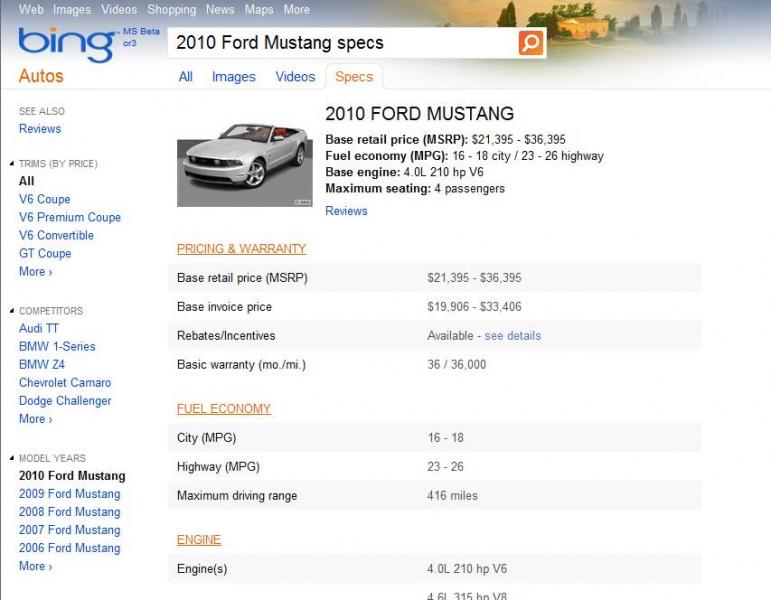Microsoft Announces Plans For A Better Bing
Today at SES in New York, Microsoft announced some further refinements to its Bing search engine. MS will flight the following changes to users over the next several weeks:
- Top rail navigation will go tabular – in response to positive use of the category navigation along the left hand side of Bing, MS is also going to adjust the top rail of the search results to include tabs that will allow for drill down into categories of content related to the user’s search. Left rail and top rail categories will vary according to the search. See below for an example:

- Search results in “auto suggest” – Microsoft’s data shows that 30% of queries from the homepage use auto-suggest (the drop downs of search terms that show up automatically when you start typing in a search query.” To take advantage of this behavior and also improve its usefulness, Bing will 1) Suggest trending topics even for a blank query box (sort of an auto suggest for when you don’t even have a search in mind) and 2) Start to include basic results right in the auto-suggest drop down list to short cut having to click through a keyword and get to a results page
- Comparison answers, starting with sports – Microsoft also finds that many searches focus on comparing one entity to another similar entity. So starting with sports (teams, players, coaches), Bing will now provide “comparison answers” as one of its category drill downs. This set of results collates comparisons between sports entities in one place so users don’t have to search back and forth between sets of results for two teams, players, etc. Microsoft intends to develop additional comparison answer capabilities in other categories throughout 2010.
- Creation of “domain task pages” (DTPs) – Of course searchers seek different types of information depending on their intent and what they are searching for. Domain task pages are new pages of search results focused on collating the most typically sought information/content for different categories of searches. Bing today launched DTPs for the auto category and will also further develop these in more categories throughout the year. Below is an illustration:

I see Microsoft’s enhancements to Bing as further evidence of a whole-scale shift in search engines away from cataloging Websites and toward providing answers, a trend I’m going to study next quarter in research for my planned report “The Future of Search.” My plan is for this research to address evolutions in search engines like those above announced by Bing, as well as next steps for Yahoo! and Google. But I’d also like to look at how search on non-PC devices will develop and how trends in other media – like the rise of biddable display media – will influence search use and advertising.
Right now, I don’t think marketers need to overhaul their search marketing plans; the best practices for bid optimization and SEO they work toward today will still apply in the environment Bing is pushing toward. But I do think that SEO ultimately gets a big adjustment. What Bing (and Yahoo!) are moving toward is an environment where keyword density and link popularity don’t determine page rank. In fact the end goal won’t be “page rank” anyway. Instead, marketers will want to optimize content to help search engines easily sort it into categories.
